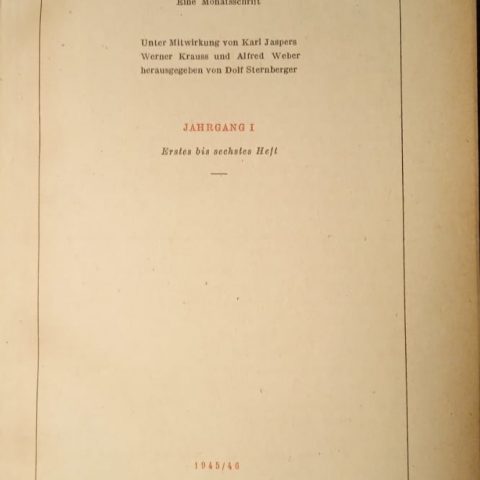Anna Axtner-Borsutzky studied German and Classical Philology at LMU Munich. She completed her state examination there in 2017, followed by her M.A. in 2018. She is co-founder of the young scholars’ network »Akademische Archive«. In March 2021 she graduated from LMU Munich with her doctoral thesis on the literary scholar Walter Müller-Seidel (1918–2010), including an edition as well as literary and scientific historical studies of his literary autobiographical remains. The thesis was funded by a scholarship from the Hanns-Seidel-Foundation and the career program of the Cusanuswerk. During her studies on Walter Müller-Seidel, she was working with the postwar journal »Die Wandlung«. Because of the journal’s special design and contents Anna Axtner-Borsutzky plans to do further research on it. Since April 1st she is Assistant Professor at University of Bielefeld (Deutsche Literatur des Mittelalters und der Frühen Neuzeit, Prof. Maximilian Benz).
My Research

The postwar journal »Die Wandlung« was edited from 1945 to 1949 by Dolf Sternberger, Karl Jaspers, Werner Krauss and Alfred Weber. The journal aimed to bring society back into conversation with each other after twelve years of silence. This was part of an indirect democratization program. Several aspects could be considered to analyze the impact of the journal on society and the transatlantic influence on the journal itself. Not only the so called »Journalpoetik« is significant, but also the topics and of course the letters sent to the editors written in the US. Discussion and debate are considered the leading motifs for democratization here. I will ask if and how the editors’ idea to change society worked through the journal.
Abstract
The postwar journal Die Wandlung (1945–1949) and the transatlantic influence on intellectual exchange
The presentation will focus on German postwar journals, especially on the Heidelberger journal »Die Wandlung«. This journal is an exemplary indicator for the chances and limits of cultural-intellectual media in shaping society in the micro-epoch from 1945 to 1949. On the basis of the conception and design of this journal, it is possible to examine the interaction of the processes of social criticism and periodicals in this period. This was precarious from several perspectives: what was marked in particular by the will to reshape on the one hand? How was the licensing policy of the American occupying power on the other? Particular attention should be paid to the rapid demise of the journal in 1949, which was accompanied not least by the currency reform of 1948 and the shift in social interests. A relevant example of this ›transfer‹ is the contact between Dolf Sternberger, Karl Jaspers and Hannah Arendt. Those transatlantic connections will be the center of the poster.
I want to investigate the impact of the transatlantic exchange on the development of the »Wandlung« and ask who was in contact with whom and about which topics. My hypothesis is that relationships from the period before World War II were the base of conversations across the Atlantic. Texts and topics of the »Wandlung« were deeply influenced by US-thoughts about democracy and freedom. Of course, there are methodological questions – beyond working in archives and reading letters – how to analyze this. In a first step there is the need to search the connections between editors and authors of the »Wandlung«, a second step could be the close reading of the texts. The question is how this journal on the one hand could be that successful close to the end of War but on the other hand disappeared that quickly after 1949. Was this an effect of competition?
Recent Publications
Jenseits der Klassik. Walter Müller-Seidels Münchner Antrittsvorlesung »Gottfried Benn und der Nationalsozialismus« (1961), in: Benn-Forum 7 (2021) [zur Publikation angenommen].
»Ein Schwarm von Texten«. Gerhard Neumanns Selbstversuch. Ein Erinnerungsbericht im Spannungsfeld von Literatur und Leben, in: Kathrin Lehnen/Carsten Gansel/Vadim Oswalt (Hg.): Schreiben, Text und Autorschaft – Zur Thematisierung, Inszenierung und Reflexion von Schreibprozessen in ausgewählten Medien und historischen Selbstzeugnissen. Göttingen 2021[erscheint im August 2021].
»Wegbereiter und Wegweiser«. (Hoch-)Schullehrerfiguren in autobiographischen Gelehrten-Erinnerungen um die Jahrtausendwende, in: Frieder von Ammon/Michael Waltenberger (Hg.): Lehrerfiguren in der deutschen Literatur. Literaturwissenschaftliche Perspektiven auf Szenarien personaler Didaxe vom Mittelalter bis zur Gegenwart. Berlin 2020 (Mikrokosmos 85), S. 368–384.

